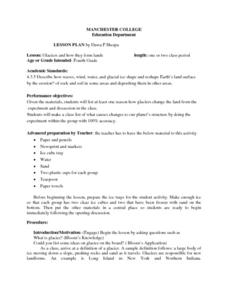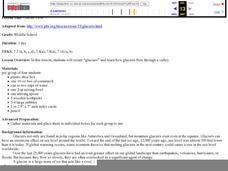Curated OER
Discovery Science Center Activities
Fourth graders complete a variety of experiments to meet science goals. In this life sciences lesson, 4th graders make yogurt, discover the attraction of opposite charges in electricity, learn the effects of glaciers, and explore...
Curated OER
Carving Mountains
Students explore geography by participating in an illustration activity. In this land-form lesson, students define vocabulary terms associated with glaciers and forests. Students utilize pens, cardboard and pottery clay to draw and...
Curated OER
Thermal Expansion
Students examine how thermal expansion of water can affect sea level. They conduct an experiment that demonstrates what happens to water levels when exposed to heat, record the results on a data sheet, and discuss the results.
Curated OER
Glaciers and How They Form lands
As a whole class, the students define glacier and perform an experiment involving glaciers. The students brainstorm ideas of what a glacier is, and narrow the ideas down to a definition. The students then participate in an activity that...
Curated OER
The Tip of the Iceberg
Learners discover the percentage of an iceberg that is above and below the water surface. They compare salt water icebergs and fresh water icebergs and if they behave the same of differently. They work with their lab group to perform...
Curated OER
Glacier Slide
Students conduct an experiment. In this glaciers lesson, students learn about glaciers and then perform an experiment to show how glaciers shape the landscape around them. Students draw a picture in their journals to illustrate their...
Curated OER
The Living Earth
Students discuss glaciers and write a definition for a glacier as a class. After discussion, they participate in an activity that demonstrates how glaciers can cause dramatic changes and create new landforms. Groups discuss their...
Curated OER
Glaciers
Seventh graders summarize how Earth processes today are similar to those that occurred in the past, and explain how slow geologic processes have large cumulative effects over long periods of time.
Curated OER
Glacier Climbing
Students discuss glaciers and the current distribution of glaciers around the Earth. They create simulated glaciers using cornstarch, shoeboxes, water, and pebbles.
Curated OER
Mystery of the Megaflood
Students will use everyday items and speeds to describe the dimensions of a massive flood that occurred in the Pacific Northwest near the end of the last ice age.
Curated OER
Erosion Lab
Eighth graders explore variables that influence the rate of erosion due to the 4 major agents. They work as a group and practice conducting experiments according to the scientific method. Students comprehend that communicating ideas...
Curated OER
Global Warming: Life in a Greenhouse
High schoolers examine the evidence that scientists have used to support the existence of global warming and the greenhouse effect. How the concepts have been developed and evaluated form the focus of this lesson.
Michigan Sea Grant
Water Quantity
It may be tricky for a young mind to conceptualize that less than 1% of all water on earth is useable for humans to drink. Simulating the amount of fresh water available on earth by removing measured amounts of water from a five-gallon...
Curated OER
Glacial Change
Students research the ways in which scientists study glaciers and glacial change. They interpret real time data and calculate the estimated global sea level rise potential. A very good lesson to illustrate global warming.
Curated OER
Indiana Ice Investigations
Fourth graders create a model of the formation of Indiana by glaciers. Working in groups with appropriate materials, they create a model documenting how glaciers moved through the land and formed the geological structure and land masses...
Curated OER
Glacier Flow
Students investigate how glaciers flow through valleys. They answer discussion questions, and in small groups create a simulation of a glacier using a plastic shoe box, water, cornstarch, and pebbles, evaluating their results on a...
Curated OER
Water Cycling in the Wilderness: Alaska quarter reverse
The Alaskan wilderness contains every imaginable element of the water cycle: it has flowing streams, cool spring rain, and frozen glaciers. Pupils use a series of worksheets to identify and define evaporation, condensation, and...
Baylor College
Why Is Water Important? Pre-assessment
This water worksheet is just the tip of the iceberg! It a multiple-choice quiz meant to be a pre-assessment for a wonderful water unit. There are 10 questions to be answered regarding the role, properties, and behavior of water. Make...
PB Works
The Short Stories of Ernest Hemingway
There is more going on under the surface of Ernest Hemingway's work than one can glean in an initial reading. A literature resource compares the themes and structures of several of Hemingway's works before prompting class members to use...
Overcoming Obstacles
Identifying Emotions in Conflicts
The takeaway from the second lesson plan in the Resolving Conflicts module is that "conflict is like an iceberg" in that we only see a small portion of what's involved in conflicts. Participants learn to identify the many unseen feelings...
K20 LEARN
A Stone's Throw Away - The Dangers Of Tradition: The Lottery
Shirley Jackson's short story "The Lottery" is the anchor text for a instructional activity that teaches young readers how to use the Tip of the Iceberg strategy to go below the surface of a tale. After reading the short story and an...
K20 LEARN
Between The Lines: Inferences In The Narrative Life Of Frederick Douglass Excerpt
Good literature can be much like an iceberg requiring readers to presume that the bulk of the meaning may be inferred to be found below the surface. Here's a lesson that asks scholars to conduct a close reading of passages from The...
National Wildlife Federation
The Tide is High, but I’m Holding On… Using ICESat Data to Investigate Sea Level Rise
Based on the rate of melting observed from 2003-2007 in Greenland, it would take less than 10 minutes to fill the Dallas Cowboys' Stadium. The 17th lesson in a series of 21 has scholars use the ICESat data to understand the ice mass...
Curated OER
On the Rise . . . Sea Level and Global Warming
Ninth graders conduct an experiment to determine how melting sea ice affect sea level. In this earth science lesson plan, 9th graders explain the environmental consequences of rising sea level. They relate this lesson plan to global...
Other popular searches
- Icebergs
- Glaciers and Icebergs
- Iceberg and the Titanic
- Iceberg of Sea Ice
- Icebergs and Salinity
- Iceberg Hermit
- Iceberg Melting Rate
- Iceberg Hemingway
- Culture Iceberg
- Cultural Iceberg
- Iceberg, Limitation
- 2006 Atlantic Iceberg

























